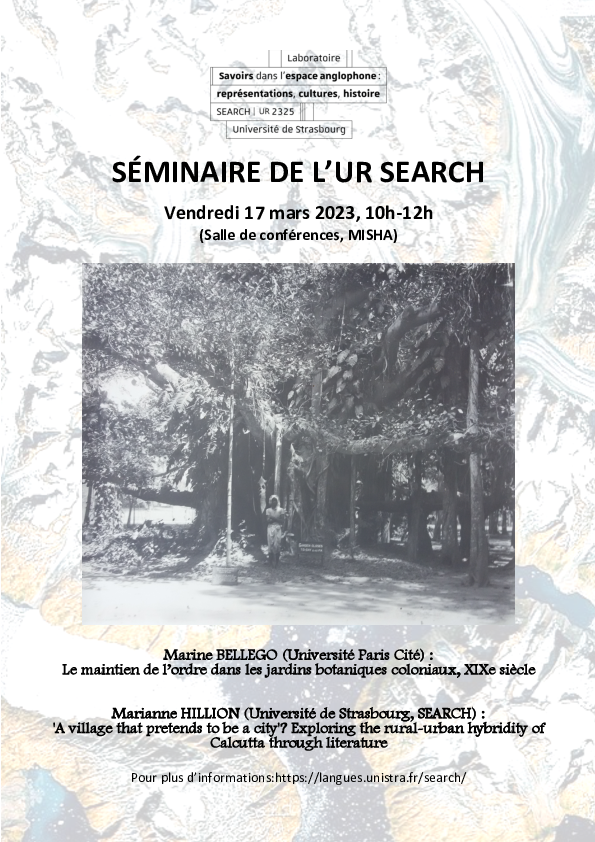Marine Bellégo, Université Paris Cité
Le maintien de l’ordre dans les jardins botaniques coloniaux, XIXe siècle
Dans l’histoire des jardins botaniques, la notion d’ordre est cruciale, et de manière plus frappante encore dans le cas des jardins botaniques coloniaux. L’ordre concerne bien sûr les collections de plantes vivantes données à voir aux visiteurs ainsi que les spécimens de plantes séchées qui forment la base de la pratique scientifique des botanistes, mais aussi le territoire même du jardin, ses frontières, les circulations qui y ont lieu et le comportement des visiteurs. Plusieurs études ont montré que les espaces des jardins étaient rarement utilisés conformément à leur usage prévu. Je voudrais ici m’intéresser aux procédures mises en oeuvre par les responsables des jardins pour s’assurer que les usages non conformes des jardins ne mettent pas ces derniers en péril. Je m’intéresserai en particulier au cas des agents chargés du maintien de l’ordre, qui n’ont pas jusqu’ici fait l’objet d’une attention spécifique, afin de contribuer à la compréhension de la notion de frontière, prise dans un sens à la fois concrète et symbolique, dans les jardins botaniques coloniaux.
Marine Bellégo est maîtresse de conférences à l’Université Paris Cité et au LARCA. Ses domaines de spécialité sont l’histoire des sciences et des savoirs, l’histoire des empires coloniaux et des jardins botaniques. Elle est l’auteur du livre Enraciner l’empire : une autre histoire du jardin botanique de Calcutta, publié en 2021. Son nouveau projet de recherche porte sur les usages des littoraux et leur réglementation.
Marianne Hillion, Université de Strasbourg
'A village that pretends to be a city'? Exploring the rural-urban hybridity of Calcutta through literature
‘A village that pretends to be a city’: Indrajit Hazra’s portrayal of Calcutta in his Short Biography of the city (2013) echoes numerous representations of Calcutta as a place in which a strong sense of community, a rather slow pace of life and a certain feeling of peripherality prevail, at odds with the common imagination of the modern metropolis. This paper examines this rural-urban overlap – which, I argue, typifies the uneven development of colonial cities – as it is captured by contemporary anglophone literary texts. Focusing on the works of Amit Chaudhuri, Indrajit Hazra and Kunal Basu, it contends that the imaginative geography of 1980s Calcutta as a large village derives in part from the primary role of the para (or neighbourhood), the ‘most ubiquitous, yet in some respects most invisible’ institution of the city (S. Chaudhuri).Rather than a geographical or administrative category, para refers to a fluctuating social and imaginative unit, an extended realm of familiarity which materializes through specific liminal sites (such as rooftops or front terraces), local institutions (the streetcorner stall) and people (such as informal watchmen), and blurs the frontiers between the public and the private domain. Sometimes tinged with nostalgia, Indian English novels and essays on 1980s Calcutta explore the complexities of everyday life in these urban villages, and thus renew our understanding of colonial and postcolonial urbanity.
Marianne Hillion is Senior Lecturer in the English department at the University of Strasbourg and a member of SEARCH. Her main research fields are postcolonial literatures and urban studies. Her PhD dissertation, entitled Between the Epic and the Ordinary: Locating the Politics of Contemporary Indian Urban Writing in English examined the literary representations of uneven urban development in three globalizing Indian cities, based on a corpus of fiction and nonfiction (Arundhati Roy, Rana Dasgupta, Amit Chaudhuri, …). She has published several chapters and articles on the dystopian and ‘ordinary’ Indian city, and on the impact of finance capitalism on urban life in London and Delhi. Since 2019, she has been co-hosting a monthly seminar on materialist approaches to literature at ENS Paris.
